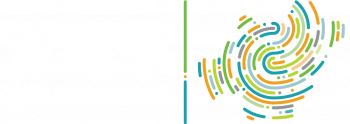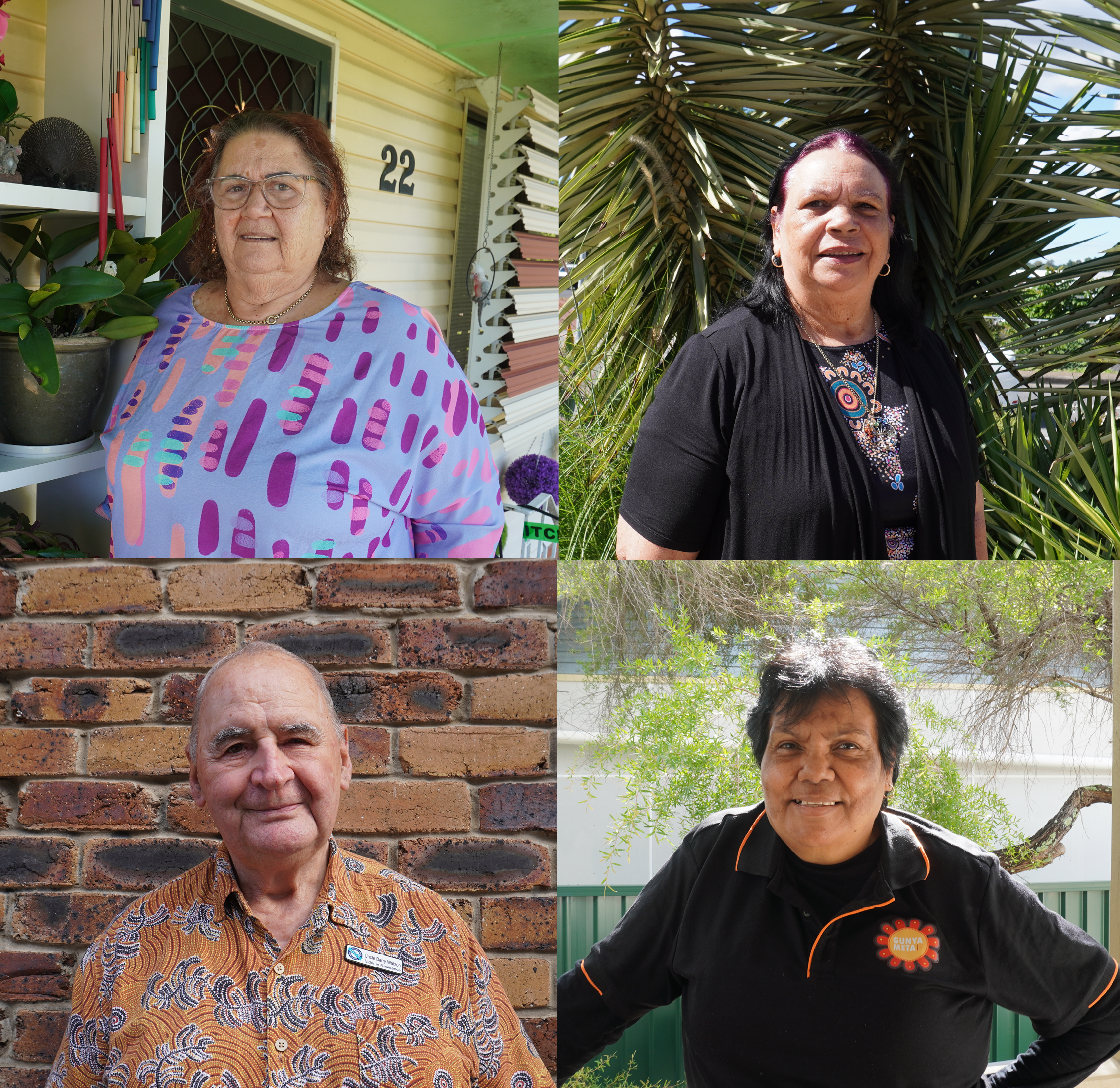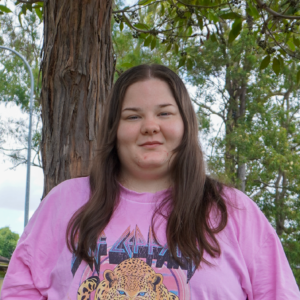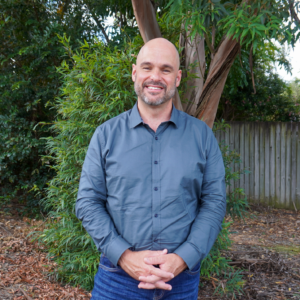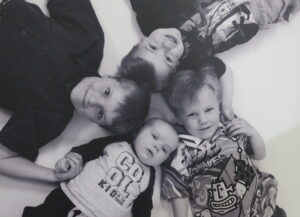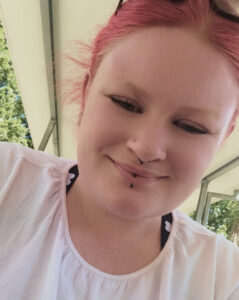Aboriginal and Torres Strait Islander people please be aware that this story contains the name of a deceased person.
And while this story focuses on the partnership between YFS and Logan District Aboriginal and Torres Strait Islander Corporation for Elders and Gunya Meta, at every turn YFS has been supported by many Aboriginal and Torres Strait Islander community members, Elders, and organisations.
The relationships between YFS and First Nations community in Logan grew from friendships like the one between YFS founder Mick Devlin and First Nations community advocate Marlene Moore.
Marlene was a strong and determined Wakka Wakka woman and a member of the Stolen Generation who was forcibly removed from her parents at Gayndah and taken to Cherbourg Mission at the age of two, along with her 7 brothers and sisters. In 1975 she moved to Logan with her husband Ray, where they raised 5 children while also advocating for First Nations’ youth.
Marlene found a safe place for her community to speak about social issues with Mick Devlin and other members of YFS’ first reference committee. She generously shared her cultural knowledge and vision for supporting the community and was part of YFS’ Board from 1987 – 1991.
As well as volunteering with YFS, Marlene had a professional career within the emerging community services and early education sectors in Logan and devoted her life to helping others reach their potential. Much too soon, Marlene passed away in 1995. She left an extraordinary legacy in the lives of her family, community, all who knew her.
Under Marlene’s influence, YFS began learning how to listen deeply to First Nations families in Logan and helped embed the principle ‘nothing about us without us’ – the idea that YFS programs or services for First Nations people should be designed and delivered with First Nations’ representation.
And since YFS’ first Board was formed in 1985 that principle has held, with at least one First Nations Director always helping shape YFS’ journey.
YFS is also indebted to other First Nations supporters, like Logan Elders Corporation and Gunya Meta, and has a rich and varied partnership with these organisations. Together they have developed the Burrabilly program, supported the Logan Elders’ NAIDOC celebrations, campaigning on many joint advocacy projects, and influenced YFS’ First Nations Cultural Framework.
YFS and Logan Elders Corporation also shared office space at 372 Kingston Road from 2013 to 2023 — where frequent conversations between Elders and YFS staff helped improve staff’s cultural awareness and helped the Logan Elders’ First Nations guests access services.
YFS is thankful for the tireless work of Logan Elders in our community and their generosity sharing their knowledge and skills with YFS throughout our 40 years. Although we only interviewed several Elders for this story, we acknowledge the incredible contributions of every Logan Elder, past and present, as well as our First Nations staff and all First Nations people within the Logan community.
Aunty Peggy Tidyman, Uncle Barry Watson, Aunty Heather Castledine, and Aunty Faith Green each have long relationships with YFS, and their contributions to our organisation include (but are in no ways limited to) Aunty Peggy’s spiritual healing workshops and her exquisite artwork in our offices, Uncle Barry’s cultural awareness training for YFS staff, Aunty Heather’s skills and strategic vision as a YFS Board Director from 2013 to 2022, and Aunty Faith’s close collaboration with YFS in her role as CEO of Gunya Meta.
In the interview snippets below, Elders share their memories of the partnership between YFS and Logan Elders and how it has impacted the Logan community.
Aunty Peggy Tidyman
“20 years ago, some of our families were still struggling to access basic needs. If we were only speaking as individuals, we didn’t have very much power so we [Logan Elders] became incorporated around 2004. And once the wider community knew that this was a voice to be reckoned with we said let’s listen to the First Nations community, let’s take concerns forward.
“We said that we would like our people to be able to walk into an organisation and feel welcome. And YFS was one of the first organisations to do that. And they have been doing it since.”
“Our partnership was about respect and advocacy and helping community access a service with cultural respect.”
“It’s not about tokenism. It’s something more meaningful. It’s about our culture, and we share that information with you.”
Uncle Barry Watson
“When I first came down to Logan in 1979, ‘elders’ was something with a small e. It just meant old Aboriginal people who were on the pension. We had no recognition in the community. There was no acknowledgement of knowledge and our role of passing things down. But as we got involved with organisations like YFS, supporting them, it slowly changed.”
“Culture and [bureaucratic] policies and procedures often clash. For instances, families sometimes struggle to keep housing because cultural practices mean they might have more people staying than are listed on the lease.”
“It’s good to know YFS are here and will listen and help. They understand culture really well because they invite the Elders to come in and tell the workers how our Aboriginal community operates.”
“It’s so important to have organisations like YFS. They’ve done a great job making sure they’re not just providing a service for people in the community but walking alongside and supporting them. It’s not a handout; it’s a relationship. That’s what makes the difference and why I think YFS has been so successful and lasted here so long.”
Aunty Heather Castledine
“I stepped up to fill a void [on the YFS Board] because the Logan Elders didn’t want that void empty. We wanted to keep the relationship going with YFS because it is such a vital part of the community itself.”
“At the start I used to feel like a fish out of water, with other Board members having backgrounds in commerce and accounting. But I knew why I was there – my connection to the Logan Elders and the community; it was important to YFS too.”
“My dad always said that things have to be built on solid ground, and it takes a while for the cement to set. That’s YFS, and what they’ve done.”
Aunty Faith Green
“YFS often asks us to come down and talk about some issues. And they tell us about a situation and ask how we think they should approach it. They bring us to the party and that’s good. They’ve been doing it a lot longer than anyone, bringing Elders voices to the forefront.”
“The key thing that YFS has done is connect with First Nation mob. And because they’ve done that, we can vouch for YFS and say ‘yeah, go down there, they’re a good organisation’.”
“What I see, in the Logan community, is we all pull together because our heart is for our people and I think that we do that well.”
